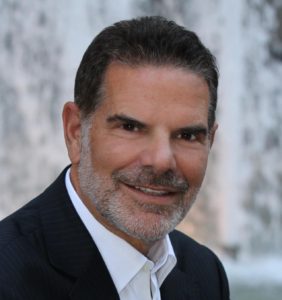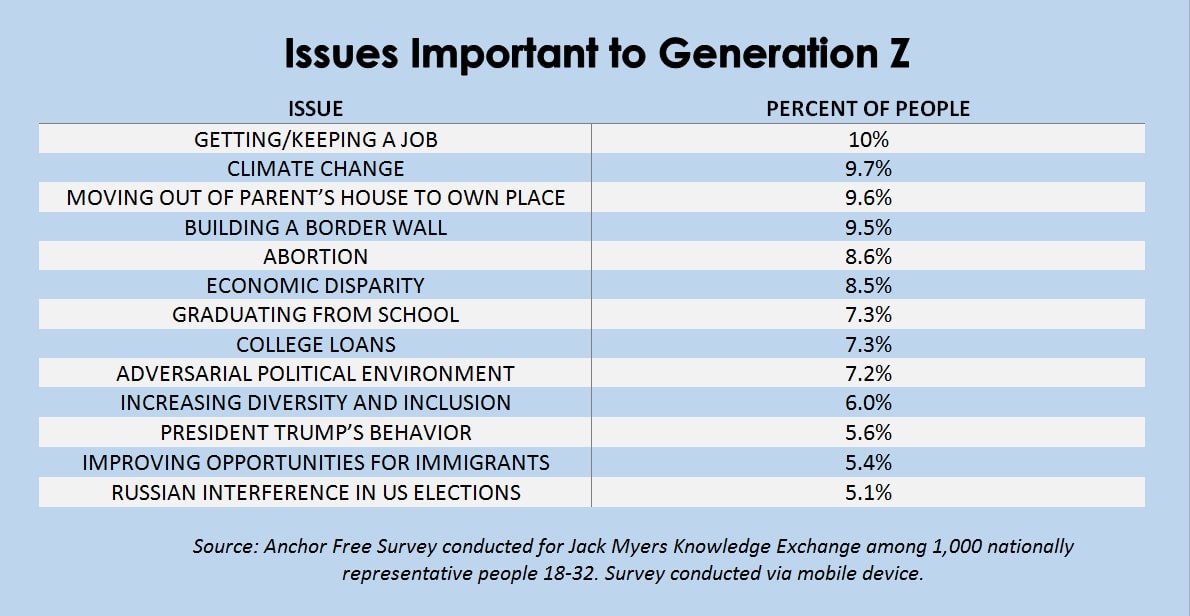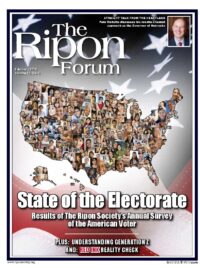
It’s been said that each generation learns from the past and that young people tend to be more progressive than their parents. It’s also been said that the generation just entering their adult years — known as Gen Z — is the smartest and most well-informed in history, having grown up online with unlimited access to news and opinions.
The reality, however, is that ubiquitous access to news and information may be having the opposite effect. According to a new study of 1,000 young people aged 18 to 32 conducted by Anchor Free for Jack Myers Knowledge Exchange, young people have become overly dependent on social and user-generated media and may, in reality, be less exposed to news sources than any recent generation.
When asked to identify their two primary sources of news, the majority of this cohort name Instagram (29%), You Tube (22%), and Facebook (15%) as the media where they are most likely to read/see the news. Fewer than a quarter of young people depend on newspaper or television news, with 8% reading national newspapers such as the New York Times, Washington Post, and USA Today, 10% watching broadcast and cable network news, and 6% exposed regularly to local television news or newspapers. Radio talk shows influence only 4.4% of young people, a number only slightly larger than Breitbart News (3.9%), and half the number that depend on late night TV for their news and information about the world. By comparison, a stunning 82% of Gen Z and younger Millennials include among their primary news sources Reddit, Twitter, Facebook, You Tube, BuzzFeed, Instagram, Snapchat and their desktop newsfeed.
When asked to identify their two primary sources of news, the majority of this cohort name Instagram (29%), You Tube (22%), and Facebook (15%).
Without the traditional filters of trusted news organizations and journalists, this new generation of potential voters may be highly susceptible to fake and biased news and may find it difficult to discern fact from fiction. Compounding this reality, Instagram — the #1 source of news for young people — is dependent almost exclusively on visual images, and none of the major social media channels invest meaningfully in original news reporting, nor do they provide user-tools for deeper investigative analysis of their content.
Accustomed to having real-time access to big stories via Facebook, Twitter and Instagram, young people inherently distrust news outlets that were lauded by older generations. This is evidenced by a recent Future of Work Research Consortium survey of Gen Z teens from all around the world in which they confessed to being super skeptical of mass media. Only 4.6% of respondents admitted to trusting the media completely, compared to over 11% who completely trusted banks and 23% who trusted the pharmaceutical industry. These three categories were actually the least trusted sectors in the survey, and yet pharma and banks beat out the media by a mile. The result is a generation that prefers news that focuses on political and social content similar to their own, with only 36% open to news that presents views different from their own.
Historically, youth is a bastion where liberalism thrives, but this first Internet generation appears to be reversing this trend. Studies indicate that today’s teens and young adults are more conservative than their Millennial predecessors. According to the Knowledge Exchange study, the political polarization apparent in society also extends to the younger generation, with 28% self-reporting as liberal and 26% identifying as alt-right. Sixteen percent say they’re progressive, compared to 12% who are politically conservative. Only 17% are centrists. With limited access to news sources, a propensity to seek news that is consistent with their pre-disposed beliefs, and little trust in institutions, Gen Z and young Millennials will be difficult to reach through traditional media and even more difficult to influence. While it’s clear that social media campaigns will be a required component of any political campaign targeting young voters, the challenge will be how to effectively engage and involve a cohort that is disengaged from the political system.
There are also no clear issues that are coalescing Gen Z into a cohesive voting bloc. When asked to identify the issues most important to them right now, no major issue was identified by more than 10% of respondents. While they are more socially aware and gender neutral, more multi-cultural and global, their issues are unusually diverse.

Finally, a warning for those politicians and their aides who embrace politics as usual: Gen Z has the strongest “BS” filter of any generation. In other words, they can see right through the spin. At the same time, they also are the least likely to actively seek out news and information on policies, positions, and the priorities of political candidates. Their worldview is informed by their online friends and social networks.
A warning for those politicians and their aides who embrace politics as usual: Gen Z has the strongest “BS” filter of any generation. In other words, they can see right through the spin.
The compelling message for politicians and marketers who seek to influence this generation is that communications must be personal, highly targeted and should reinforce pre-conceived ideas. Generic messages targeted to generic audiences, and assumptions that Gen Z is a predictable generation, will be misguided.
Jack Myers is the founder of MediaVillage and chairman of Jack Myers Knowledge Exchange. He is also the author of Hooked Up: A New Generation’s Surprising Take on Sex, Violence and Saving the World.




